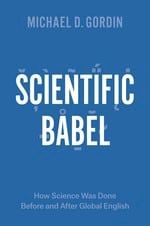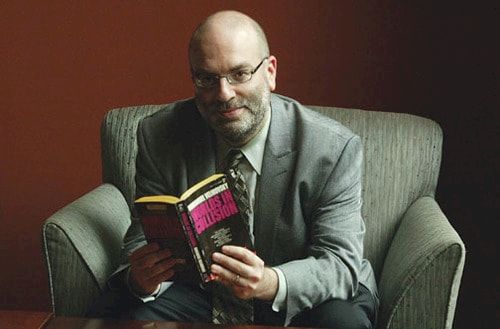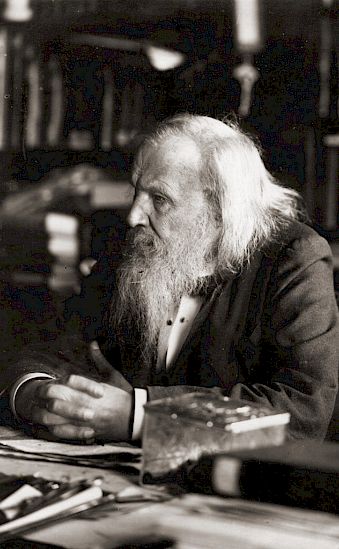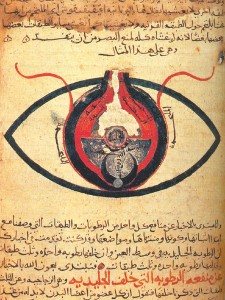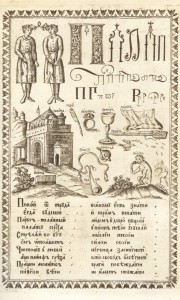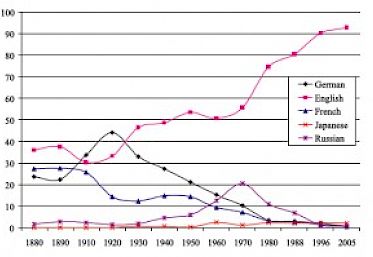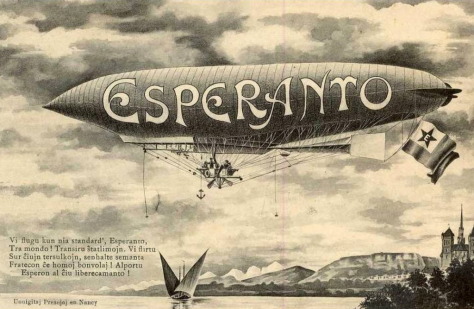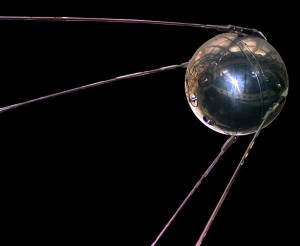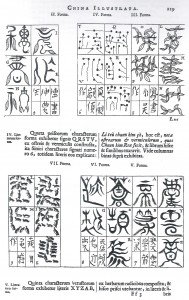Monoglot Empire: Tracing the Journey from Scientific Babel to Global English with Michael Gordin
If you can read this, you read English. That might not seem like such a big accomplishment–perhaps English is your mother tongue, or maybe as a consumer of historical scholarship you merely took it for granted that developing an excellent level of English comprehension was a requirement for the job. Seen in historical perspective, however, the linguistic landscape that makes it common sense for you to read this blog post–and not, say, one in Portuguese or Persian–is quite unusual. We live in a monoglot world of science and scholarship today, but for much of the historical record, the case was the opposite, as Russians struggled to learn French and Englishmen apologized for their poor German, even as a functional command of three or four languages was necessary merely to access everything published.
Making things more bewildering, however, we have lived in a monoglot world before–one, however, dominated by Latin and not the West Germanic language so many of us now call our own. Not only that, the English that has succeeded as the uniform standard has, as any non-native speaker can tell you, plenty of confusing features: phonemic polyvocality ("stiff," "stuff," and "staff" denote very different things), and plenty of irregular verbs ("freeze" in the past is "froze," not "freezed," for example). So why didn't something more logical and, perhaps more importantly, not ethnic–something not already spoken by the English–win out? Why didn't a more accessible constructed language, like Esperanto, succeed? How did this tectonic shift happen? How did we move from linguistic chaos to seemingly greater uniformity?
These are some of the questions taken up by Michael Gordin, Rosengarten Professor of Modern and Contemporary History at Princeton University, in his latest book, Scientific Babel: How Science Was Done Before and After Global English, published earlier this year by the University of Chicago Press. While Gordin's first monograph concerned itself with Dmitry Mendeleev (inventor of the periodic table), readers may also be familiar with his two books on the history of the of the atomic bomb, or his more recent volume on self-proclaimed cosmologist Immanuel Velikovsky and twentieth-century debates over standards of science and pseudoscience. In Scientific Babel, Gordin shows off his ability not only to digest complex scientific prose–in Russian, German, and French, in addition to his native English–but also to connect issues in the history of science with global trends in the modern period. That makes his work one of the most exciting things going in scholarship on the history of science today. It also makes him our guest in this, our first science-directed edition of the Global History Forum.
•
Speaking with Gordin over the telephone this May, we had the chance to discuss his intellectual formation before delving into a discussion of Scientific Babel itself. Born in northern New Jersey, Gordin was the son of two peripatetic Israelis–his father was a petrochemical engineer—which meant frequent moves. Childhood in New Jersey meant that English became Gordin's mother tongue, but his parents spoke Hebrew to one another, and deliberately maintained it as a sort of secret language for inter-parental communication when Gordin and siblings needed to be kept out of the loop. (Gordin notes that he learned Hebrew later in life, and now speaks a Hebrew-English patois with his parents, although English remains the standard for speaking with his siblings.) The family kept moving around–first to the United Kingdom, then to Israel, then back to the United States. All the same, Gordin's ambition remained constant: to become a scientist. This meant, preferably, getting excellent grades in high school science courses and then to gain admission to a university like the Massachusetts Institute for Technology (MIT), CalTech, or Stanford.
But a funny thing happened along the way to fulfilling this plan. While attending high school, Gordin excelled in the science courses as planned. But more and more, he found that his real area of interest was history. High school teachers encouraged him to pursue both lines of study, but it remained unclear how, exactly, to do so. The answer came when Gordin, along with several hundred other incoming Harvard freshmen, were trekking through the backwoods of the Eastern seaboard prior to their first-year orientation. There was, another student told him, a concentration at Harvard in the History of Science. More than that, a star professor, Peter Galison, had just been lured away from Stanford to teach courses in the subject at Harvard. The next week, Gordin dropped in to take what turned out to be Galison's first course at Harvard, and it seemed to offer the perfect balance of hard science and the humanities. Harvard's tough undergraduate requirements meant that undergraduates pursuing the concentration needed coursework in subjects like quantum mechanics or thermodynamics, which Gordin could handle. Soon, he had graduate with a Bachelor's Degree in the History of Science.
Gordin opted to remain in Cambridge for his graduate work, which meant a more sustained engagement not only with coursework but also with some of the themes than would later come to populate Scientific Babel. On the one hand, Gordin jokes, there was the humbling experience of lab courses with actual Harvard PhDs in the hard sciences–physics courses that he took along with then fellow graduate student and now-MIT historian David Kaiser, which underscored how difficult the "inherent physics" at the heart of their subject matter was. Capable in the physics material up to a high level, Gordin nonetheless grew attentive to the political economy. Language, however, remained a secondary concern. For even though the hallways of Harvard's Science Center in the early 1990s were awash in the ь's and щ's of Russian (the Soviet Union had collapsed, and somewhere between a tenth and a fifth of the had landed at Western institutions), there was comparatively little attention among historians then to scientific language per se. True, a linguistic turn in history departments meant that concerns about meaning and power were everywhere. Curiously, however, even though thinkers like Jacques Derrida were products of polylingual mileaux like French Algeria, debates about the actual choice of literal language were hard to find in graduate seminars about deconstruction and hegemony.
Thus, for the moment, even as Gordin launched into a successful career as a historian of science–first Harvard's Society of Fellows, then the Princeton History Department–language hovered mostly in the background of his early work. Reading the correspondence of Dmitry Mendeleev, it became clear to Gordin how poor Mendeleev's German and French were, and the extent to which this limited both the European reception of Mendeleev's work and the foreign literature to which Mendeleev had access. Gordin's later work on the American atomic weapons program had less obviously to do with language, but even there, the theme kept appearing. When, for example, Soviet intelligence stole the blueprints for the atomic bomb from the Manhattan Project, NKVD intelligence officers faced a linguistic conundrum: even though the reports were in English, they needed both to translate them into Russian and present them as if they were already in idiomatic scientific Russian, eliminating any trace of the American English "embedded" in the original document. And when Gordin worked on Velikovsky and pseudoscience, he noted, an interest in scientific language was perhaps hard to find, inasmuch as the languages Velikovsky used most actively–Russian and English–were the same as Gordin's mother tongue and the research language he had best mastered.
All the same, after working so much at the intersections of Russian and Soviet history and the history of science, by the late 2000s Gordin thought he had the idea for his next project: a history of Russian as a scientific language. He dove into several months of reading everything he could, but he soon ran aground on the cliffs and crags of … French, German, and English, the relationship of which to the historical development of Russian seemed impossible to separate. Hence Gordin's first big lesson: language, even if one is monolingual, exists in, and is perhaps even primarily historically interesting, because of its ecology–what other languages does it exist around? Having internalized this lesson–and gained a deeper knowledge by co-teaching Princeton seminars with Classics professor and philologist Joshua Katz–Gordin realized that centering the narrative around English, and deliberately taking a wide view, would result in something bigger than study of scientific Russian. His primary intended readership, he stresses, are "Anglophones who think they're monolingual. I want them to realize that the present state of English is odd. Scientific Babel is an attempt to explain why."
Before going any further, we ask Gordin to clarify something: what did he mean by "scientific Russian"? What do we mean today by "scientific English"? More broadly, what makes a language scientific at all? "For me," says Gordin, "I think the most workable definition of a scientific language is that scientists use it. We have an obsession with this picture of the scientist as a solitary genius, but the more common reality is that science is a social activity. Science, and scientific language needs to have a body of users who use it." This means that any language could in theory become a scientific language–a point of view that not all historical observers would have agreed with. People have historically argued that truly scientific languages needed a copula (i.e. a conjugated form of the verb "to be" in the present tense – "I am happy" as opposed to "I–happy.") Yet such a definition would rule out Russian, Classical Chinese and Turkic languages, all of which have been platforms for scientific language either in the past or to this day. Others historically argued that Roman orthography was necessary, as if Abbasid scholars had not done just fine with Arabic, or as if China had no similar tradition.
The only features, notes Gordin, that one can really state with some certainty as criteria for a scientific language is the ability to name new compounds (critical for chemistry), and for some agreement that scientific terms have specific meanings. "Potential," "work," and "energy" mean specific things that colloquial usage does not necessarily denote, but the point is that we could just as easily pick out, as social animals, new words for those concepts if we wished to. "Language," adds Gordin, "is arbitrary in the sense that there's no primal reason why the word 'tree' has to mean 'tree,' but you need consensus for everything to work. Language may be intensely personal to many of us, but it's also social and agreed upon."
This question out of the way, we discuss one of the central wishes that Gordin has for the book's readers. "We inhabit a monoglot world today–one dominated by English," he notes. "But people sometimes go on to assume a monoglot past from this." But not only is this not true; more than that, the history of switches from monoglot-ness to polyglot-ness and back was itself marked by unexpected turns and twists that provide the only historical record we have when, for example, we speculate about the possibility of a post-Global English world.
Take the career of Latin, for example, the language whose dominance came perhaps closest to that of English today. Latin thrived under the patronage of the Romans, but its story is not that of mere rise and domination. During the heights of the Roman Republic and Empire, explains Gordin in Scientific Babel, Latin eradicated every language it came into contact with, except Greek. Indeed, most of the Roman élite was bilingual in Greek and Latin, just as well-known Hellephone scientists Ptolemy and Galen took Roman names. Most people in the eastern Roman Empire spoke Aramaic, Coptic, Armenian, or other languages as their mother tongue, but Koine ("common") Greek became the dominant language for intellectual discourse in much of the late Republic and early Empire. Latin swelled with Greek-origin scientific terms, "but some scientific writings are hardly sufficient to generate a language of science. Latin," writes Gordin, "was not widely used as a scientific language by any of the major schools of natural philosophy for at least half a millennia after the fall of Rome."
So why did Latin become so powerful after it lost its most important imperial patron? The answer came from relative newcomer Arabic, which, as the language of science in Abbasid Baghdad, absorbed huge amounts of Greek philosophy and science during the Middle Ages. Greek science had constituted the apex of scientific wisdom for centuries, and the Caliphate–abetted by the rise of paper–abetted a scientific Renaissance from Persia to Spain. Military defeats kept Arabic from sweeping across the peninsula of northwestern Eurasia otherwise known as Europe. But as paper technology spread into Europe, Latin blossomed as scholars began to translate Arabic-language texts (both originals and translations of the lost Greek) into Latin. (Latin, of course, had remained around in the first place as a language of scholarship due to the Roman Catholic Church, whose patronage of the language made it possible for Latin to "absorb" Arabic terms in the 12th century.) This huge wave of translation–the translation wave that, notably, did not take place under the Hellenophile Romans–swiftly endowed Latin with a rich vocabulary of scientific terms. Even as administrations and states across the Continent often adopted the vernacular for local rule, Latin remained powerful as the language of scientific activity until (roughly) the 17th century. (Consider the fact that Newton's 1687 Principia was in Latin, while his 1704 Opticks was in English.)
But if there was such a thing as a real existing monoglot scientific world–something many people today see as desirable if not natural–why did this linguistic Pax Latinica decline? Gordin suggests a few reasons for the downfall of Latin, while acknowledging that any monocausal explanation is likely to fail. The classicizing form of Latin beloved by Renaissance humanists, he suggests, was resistant to adaptation, creating a valence around Latin that was ill-suited to the new vocabulary demanded by scientific discoveries. Further, however, as scientists like Newton and Galileo sought to communicate more with growing national scientific classes, they sought to do so in their native tongue (Galileo shifted to Italian some 80 years before Newton moved to English.) Finally, the Protestant Reformation did damage to the reputation of Latin across Europe. Still, Gordin notes that the transition to Scientific Babel was complicated. Many Protestants did not just abandon Latin, and given the then-weak institutionalization of a standard language for Germanic Europe, German-speaking scholars were slower than others to move to non-Latin languages: their only good option would have been French, which carried distasteful tones of Francophilia, not a neutral choice for the dignity of scientific exchange (at least if you lived outside of Paris).
In any event, by the 19th century scientists across Europe found themselves in a state of linguistic chaos. Mastery of French, German, and English had become a requirement for anyone who wanted to both read and contribute to European discussions about science, a task difficult enough for those lucky enough to have one or more of the three as a native language, and nigh-impossible for those born outside of the triumvirate (to give one example of how Latin vocabulary remains in English today). The struggle was particularly bitter for speakers of languages of burgeoning powers that were powerful enough to have some sponsorship of science, but not powerful enough to make a lasting linguistic imprint on the international scientific landscape–polities like the Russian Empire, or, later in the nineteenth century, the Japanese Empire.Scientific Babel spends some time on the Russian case in particular.
The fact that Russian succeeded as a scientific language at all is rather surprising. The difficulty was not, as one might think, the Cyrillic script of the Russian language, or even the challenging grammar, which combines grammatically gendered nouns with inflection. (That is, in Russian, the sentence "Pushkin kicked Tolstoy" can be rendered to have the same meaning as "Tolstoy kicked Pushkin" without changing the word order; non-inflected languages like English are more dependent on word order for their users to extract meaning.) Rather, the challenge consisted in injecting Russian into the spaces of science both within the Russian Empire and without. Not only subjects of the Tsar themselves would have to write in Russian, but Englishmen, Frenchmen, and Teutons would need to believe it worthwhile to learn Russian to read scholarly proceedings only available in that language.
It was a giant task. True, thanks to the efforts of polymaths and scientists like Mikhail Lomonosov, the Russian language acquired its modern form in the middle and late eighteenth century, but much scientific activity within the Empire was conducted in German. Not only German-speaking subjects but also much of the Slavic scientific élite, especially in its communication with non-Russian speakers, used German, humorously dubbed "the common Slavic language" vis-à-vis its bridge function role for conversations with Czechs and others. Making things worse, moreover, the pedagogical materials for learning Latin–itself of declining use for communications with Western Europeans–were much better in German than they were in Russian itself. The incentives to publish in Russian, much less convince non-native speakers of Russian elsewhere to pay attention to it, were depressingly low.
The language imbalance led to serious intellectual consequences for Russian-speaking scientists. Russians had their own journals in Petersburg, but no foreigners read them, and hence many relied on unusual transnational enterprises like the Heidelberg-based Zeitschrift für Chemie, whose editor, Friedrich Beilstein, was a bilingual native of St. Petersburg. But even these bridges into German-speaking science–and, one would think, European recognition–proved rickety. When, for example, Dmitry Mendeleev submitted a condensed version of his key findings on the periodic table of chemistry to the Zeitschrift, the journal translated his findings. But when they did so, editors mistakenly translated the key concept in Mendeleev's contribution (периодичность, or periodicity) as stufenweise (step-wise). This made it seem as if Mendeleev had missed the core point about the properties of elements for a mere symptom. This led to major arguments about the hierarchy of linguistic prestige when it came to scientific discoveries, as German chemist Lothar Meyer, working in the same field, soon published his own findings in the most prestigious German-language journal of the day, the Munich-based Annalen der Chemie und Pharmacie. There, he recognized Mendeleev's contributions, but characterized the Russian's work as helpful to his own discovery of periodicity as the key characteristic of chemical elements.
Who was right? Both chemists had grasped the key concept, but at stake was which kind of publication–and which language–"counted" for scientific discovery. After all, even before the question of false translation, Mendeleev had published his findings in Russian already well before the German translation in the Zeitschrift für Chemie. Was it really his fault that Germans–much less English or French scientists–did not read the Russian original?
The dispute soured relations between the two giants of chemistry for years. And when other Russian chemists, like Kazan University's Aleksandr Butlerov, arranged for their work to be translated into German, they insisted that "Translated from the Russian" stand prominently on the cover page. Even then, however, Russian scientists seeking to communicate to a German-language scientific world faced an uphill battle. Not only were they often at the mercy of Russian-German translators when it came to their work receiving a large reception. More than that, appearing in translation before other authors appeared in the original was what counted for credit. The work of Mendeleev, Butlerov, and others secured Russian-language scholarship some credit, but the demands of coping with Scientific Babel were becoming great indeed. Élites in Petersburg and Tokyo had successfully created scientific communities, but surely no one could be expected to read English, French, German, Russian, and Japanese in addition to being a scientific expert.
It was out of this conundrum that the interest in constructed languages arose–languages like Esperanto (to take the best-known example), or Ido, or Volapük. The important thing to stress here, notes Gordin, is that "constructed languages were serious. They weren't a joke." As inhabitants of a world in which English, a language with hundreds of millions of native speakers, reigns dominant, the idea of agreeing on a constructed auxiliary language as a global second language seems pointless to us. But it's important to recall that any non-constructed language bore tones of nationalism or particularism: what Francophones regarded as the "natural beauty" and "elegance" of their language, German- and English-speakers were likely to regard as a disguise for a warren of pluperfects and tricky pronunciations; what German speakers or Germanophiles regarded as clear pronunciation and a logical grammar, non-German speakers were likely to view as cover for the scientific corollary to the Hun's militarism.
Beyond such spats and more to the point, though, standardization was in the spirit of the time. As we have seen in other Global History Forum interviews, in the late nineteenth and early twentieth century, progressively minded thinkers (scientists disproportionate among them) were interested in how best to rationalize and standardize many aspects of an increasingly globalized world. Sometimes the impulse was for time standardization; other times, for standardized pronunciation within languages–this was, Gordin notes, the age of Received Pronunciation institutionalization in Great Britain. The world had to be simplified before it got too complicated.
Out of this conjuncture came attempts at constructed languages–ways to break through the Babel of German, French, English, and Russian that plagued European scientific communication. One of the most serious, if also lesser-known today, was Volapük, invented by the Roman Catholic priest Johann Martin Schleyer, who tended to a parish in southern Germany. Just as mankind had been united via international postal and telegraph unions, so, too, would Volapük ("language of the world") supplant all ethnic languages as a common first language. (Here, it differs from other attempts, like Esperanto, which "merely" aspired to become a common second language.) Schleyer constructed the language out of thousands of fundamental roots derived mostly from English and German words, but these roots themselves had to be modified in a few ways: they had to begin and end with consonants so as to be consistent with the language's grammar, and every "r" became an "l," for the convenience of East Asians learning the language. Take the word jimatel, for example. "Mat" is a core root denoting "mate" (derived, obviously, from English). The "el" suffix denotes an actor–so, someone who mates. And the "Ji" prefix feminizes the root. So jimatel is a female person who mates, thus, "wife."
Call it sexist, or difficult to parse if you like, but the fact is that people first flocked to Volapük and other constructed languages like Esperanto. Even within the Esperanto movement, however, there were concerns over canonicity versus adaptation. Esperanto, itself the invention of Polish physician and inventor L.L. Zamenhof, had a number of novel characters and accent signs, arguably making it needlessly complicated. Further, Esperanto's grammar and vocabulary were themselves tightly regulated based on Zamenhof's principles, leading to disputes between dogmatists and others who argued that Esperanto could be improved and made more scientific. Reformers like Louis Couturat (inventor of the Ido language), for example, asked why the word for "bird" in Esperanto was "birdo," a strange Anglo-Romance cognate. Instead, they argued that the most methodical approach would to plumb the most "important" world languages (read: European languages) for common points of vocabulary overlap, then construct a word from there based on what the most common shared root was. To continue the example of "bird," looking through the words in Italian, French, and so on, Idists determined that "ucelo" was the most common and thus methodical root. Or compare the word for "ship" (the seabound vehicle, not the thing you do to packages): Esperanto used ŝipo ("Shipo"); Ido, navo (like the root for "navigation.") It might not sound like the basis for broken friendships and intellectual partnerships between people whose purpose had been to transcend linguistic nationalism, but it was. And when the First World War erupted, many of the impulses that had originally motivated noble attempts to bridge linguistic divides suddenly seemed parochial, if not sinister.
Fatefully, however, linguistic nationalism during the First World War also cut the knees out from under scientific German. Even in the supposedly monolingual United States, the instruction of German was, Gordin demonstrates, surprisingly well-institutionalized across multiple levels of the educational system in pre-World War I America. Not only was there a substantial population of bilingual German-speaking Americans who hailed from the mother country; more than that, career-minded scientists typically spent several post-doctoral years at German universities to ripen up–the opposite of the general pattern today, as Auslandserfahrung (experience abroad) is coveted even for those seeking to make a career primarily within German universities. But things changed in the 1910s and 1920s. As post-docs became professors, and professors became university presidents, the funding and sophistication of scientific work in North America improved. Perhaps more importantly, linguistic nationalism and a post-World War I boycott of German scholars and German-language contributions from many international venues until the late 1920s. Granted, German was far from dead. Support from Sweden (home to many scientists who had trained in Germany) and, of all places, the Soviet Union (also a scientific pariah during the interwar years) helped curb a dramatic decline in German publications (which still increased during these years), but serious damage had been done.
Yet whereas scientific German might have been productively integrated into the international landscape following the end to boycotts, the Nazi dictatorship intervened. Under Hitler, many leading German-speaking scientists, such as Lise Meitner and Albert Einstein, sought refuge abroad, leading to a brain drain that eventually impacted German's prestige. But quixotic attempts to create a "German Physics" (read: no Jews) aside, Hitler's war against the Soviet Union, and the subsequent total defeat of Germany by the Red Army and the Allies led to new lows for German's place in the international scientific landscape. True, Western associations did not boycott German-language publications as after the First World War–many scientists recognized the need to communicate more actively with their German colleagues so as not to leave them isolated. Yet at precisely the same time that American educational and scientific infrastructure was expanding massively, links between the German scientific community and its neighbors were minimal. Twelve years of isolation had taken their toll. More than that, Germans were themselves a nation divided. Carved into two states, one capitalist and one socialist, Germans would continue to publish actively in their native language, but even after reunification, it would remain clearly secondary to English, even when it came to collaborations between, say, Germans and Czechs or Germans and Russians.
It is to the Russians–or, more precisely, the Soviets–that Gordin returns in the closing chapters of Scientific Babel. If the Russian Empire had been peripheral to international science in the days of Mendeleev, the picture had changed by the 1950s. In the field of chemistry alone, Russian went from constituting 2.5% of all abstracted articles in 1913 to 23% in 1970. By the 1970s, the Soviet Union produced as much literature in chemistry as did the United States, and the figures were not much different for other fields. Further, the Russian-language material was of high quality. (The Soviet Union sponsored top-quality foreign-language scientific journals in German, French, and English, but they had been gradually phased out–the German edition in the late 1930s, the French- and English-language offerings in 1947.) Even as the multinational Soviet Union sponsored education and national identity in hundreds of Eurasian languages, substantial scientific research by scientists from Vladivostok to Riga, from Tashkent to Baku, took place in Russian. Scientific Russian was everywhere, and very, very few foreign scientists were competent to read it. "This need not have generated a crisis," notes Gordin. After all, in the early twentieth century, faced with heaps of German-language publication, Americans simply … learned German. But much of the necessary infrastructure for language learning in place before World War I had been dismantled. The setting was thus ripe for what was becoming an American tradition, namely a geopolitically induced panic over the state of the nation's education.
How to respond? Some institutions, such as MIT, responded by creating courses in "scientific Russian" that purported to give science PhD students the ability to, with some patience, parse out Russian sentences and rearrange them into idiomatic English. There was no point in training for Dostoevsky, the line of thinking went–Russian syntax was similar enough to English that three hours a week of instruction, over the course of a year, could allow graduate students to read Soviet scientific articles. More successful were two other enterprises, machine translation (MT) and cover-to-cover translation. Linguists at Georgetown University created a "translation system" that could parse 250 Russian words and their grammatical position in sentences based on abstruse coding rules attached to them. In the age of Google Translate, these Cold War attempts at translation might seem primitive, but it's worthwhile noting that machine translation tackled a rather more ambitious task than programs like Google Translate, which merely compare the existing corpus of (for example) English and Russian texts and render probabilistic translations based on the frequency of the overlap of certain words. (In that sense, these programs are merely built upon mountains of cover-to-cover translation, of which more in a moment.) Machine translation, in contrast, aimed to crack the actual syntax of language and the way that syntax affects the way individual words are individually parsed. From 1956-66, MT at Georgetown boomed, flush with CIA and NSF funding that reached sums typically unheard of outside of nuclear physics laboratories or public health clinics.
But machine translation was not the only field to boom thanks to Cold War funding. Parallel to efforts at universities, entrepreneurs like Earl Maxwell Coleman, founder of the firm Consultants Bureau, launched one of the Cold War's great translation endeavors, cover-to-cover translation. Rather than dealing with the mechanics of translation, Coleman applied brute force logic to the necessity of translation: if the Soviets were churning out journal after journal, why not just translate them all with an army of lowly paid translators–graduate students, Russian émigrés, indeed anyone able to speed-translate Russian on a piece rate? Amazingly, this cold-blooded business plan worked even before the federal government began funding such projects. By the mid-1950s, Consultants Bureau was translating 34,000 pages of Russian-English translation a year, without government subsidies.
Academic institutions like the American Institute of Physics soon began running cover-to-cover operations themselves, supported by funding from the NSF. The National Science Foundation continued supporting new translation efforts for Soviet journals, and by the early 1960s cover-to-cover was probably the largest translation operation in the history of the world, much less the history of science. While critical evaluations of MT programs in the mid-1960s dealt serious damage to that enterprise, cover-to-cover flourished. Not only was it useful to an American readership, but American cover-to-cover efforts also made it easier for audiences in, say, Nigeria or Pakistan to access Soviet science without reading Russian. This, needless to say, had the effect of maintaining English's global dominance, even as the Soviets engaged in translation programs of their own. (As noted above, it also created a huge corpus of comparable materials that systemic translation programs could then compare, thus undergirding a rival to MT.)
And so the Cold War linguistic landscape persisted–until the Wall fell, Yeltsin stood upon tanks in Moscow, and, soon, Russian-speakers flocked to English-speaking places like Harvard, where Gordin encountered them as an undergraduate and graduate student. A Cold War world of, if not linguistic parity, then détente, was over. A truly English-dominated world had emerged. This post-war settlement had winners and losers, although not necessarily the same ones as emerged from the Cold War. Speakers of secondary languages inside the Soviet Union, like Kazakh or Azeri, could now proceed directly to English, although given the strength of post-Soviet scientific ties it remained unclear whether a knowledge of Russian was still a safer bet.
More broadly, people outside the great Anglophone fold faced an uphill battle in acquiring scientific knowledge. The quality of scientific education in, say, Hausa, may be pretty good at the primary or secondary level. But access to high-level scientific knowledge, particularly at the graduate level, comes increasingly through English. Without indulging in any speculation about certain languages being "naturally" better suited towards scientific communication, it's uncontroversial that one is likely to think and express oneself better in one's native tongue than outside of it. Barring the rise of a common non-ethnic auxiliary (like Esperanto or Ido), however, non-native speakers obviously face a systemic obstacle to international recognition, just as Mendeleev did.
But could this change? Is English, now seemingly secure, likely to be surpassed in the same way that Latin once was? Here Gordin urges caution. If English does decline–which we can't predict–what is certain is that science is unlikely to suddenly be conducted everywhere in Chinese, from Santiago to Canberra. And even if one overlooks the fact that Chinese itself has multiple dialects, the institutionalization of cover-to-cover translation strongly militates against the rise of another genuinely global rival to English. Barring exogenous factors and the existing position of English, it is hard to imagine the Chinese Ministry of Education launching its own massive cover-to-cover product to translate journals most of which are already in English into Chinese, read by native Chinese speakers and no one else.
More fundamentally, however, there's no reason to expect a shift from one monoglot world to another. If one does subscribe to narratives of American decline (and, perhaps, with it, a decline in American state funding for sciences and thus the overall production of scientific knowledge in English), one might expect not the rise of a single language, but rather the fragmentation of science into different nationally- or regionally-bound linguistic boxes, as was once the case. Chinese scholars who currently fill positions at state universities threatened by cuts, for example, might find it preferable to take up positions in Beijing or Dalian and communicate primarily with Chinese scholars, thus losing a command of English over time. The same goes for French or German scholars, or former Soviet citizens. The language of lab work in, say, the Netherlands or the Czech Republic might be Dutch or Czech, respectively, but the scholars running those labs might turn more to publishing in German than in English. Just as Latin once did, English might become more provincial (or itself splinter into dialects) as Babel set in. That prospect might delight nationalists in Beijing and Moscow, but consider the alternative of having to learn Chinese and Spanish, Russian and French, German and Portuguese merely to navigate the literature. Perhaps it is not too late for Esperanto to mount a comeback?
•
As our interview approaches its end, we ask Gordin what he's been reading recently–what books, so to speak, lie either on his nightstand or within arm's reach at his office. What comes first to mind might sound surprising: recently, he notes, he's been beefing up on books about the history of Easter Island. Far from delving into a new subfield, however, Gordin is merely preparing for an upcoming Princeton University alumni trip to the famous Polynesian island that he's leading. That means reading everything he can find about Easter Island, even if the historiography of the Chilean territory isn't quite as fascinating as the monumental statues that mark its prime attraction. Beyond his preparations for the trip, however, Gordin notes that he has especially enjoyed The Lost Children, the latest work by University of Chicago historian (and recent MacArthur award recipient) Tara Zahra, who has written on the intersection of nationalism and children's rights in Central Europe in the twentieth century.
The other work Gordin mentions is Rudolf Mrázek's Engineers of Happy Land: Technology and Nationalism in a Colony. Published in 2002, the book explores the late colonial period of the Dutch East Indies (today Indonesia), exploring the history of relations between the European Dutch and natives not through the lens of nascent nationalisms, but through the ways in which Dutch and East Indians thought about modernity through technology. (Having read it recently, this interviewer can note that the book is worthwhile both as much for historians of empire and colonialism as it is for historians of science and technology.) It all goes to show how much a wide-ranging reading diet–equal parts islands, equal parts Mitteleuropa–goes towards informing a historian's curiosity.

Informed by these and other works, Gordin is already thinking about his next book-length project: a centuries-long history of Prague as a city of the scientific and technical world. If you don't typically associate Prague with science, that's normal, says Gordin. "The usual image we have of Prague is 'pretty but peripheral.'" Indeed, today, most probably associate the Bohemian metropole with a certain rose-colored and nostalgic vision of a certain quaint Mitteleuropa – that, or the touristy Prague of stag parties, as a gateway to "Eastern Europe" open since the fall of the Iron Curtain.
But as Gordin underscores, Prague was also a city where Einstein and Kepler worked, and the story of science and scholarship conducted out of the city is also one of the shifting prestige of various scientific languages. It's no coincidence that perhaps the best-known writer of Prague, Franz Kafka, wrote in German not Czech, and graduates of German education will know from their Brockhaus that (even if it's an oversimplification) that the Charles University in Prague was the "first German university." (Classes were in Latin until 1784, and there was no German national state to belong to, in any event, until 1871.)
In any event, this tension between Czech, German, Latin and other languages as Prague moved from the Habsburg Empire to independent Czechoslovakia to German protectorate to forced membership in the Eastern Bloc is not only perhaps the main drama in modern Czech history, but also the driving theme in the history of sciences in the city on the Vltava. Throughout the late 19th and early 20th century, notes Gordin, Czech's relationship to the prestige scientific languages of German (less so English) remains compelling; even the years of Nazi occupation in some ways marked a high point for the University as a German institution, as the un-bombed Prague was an attractive place for study and research for scientists across Hitler's Europe. The postwar years bring the story of scientific Russian into the mix, too, as, like universities in East Germany, Prague's were subject to attempts to institutionalize Russian as the dominant non-native scientific language. "Prague," notes Gordin, "is just an interesting place where different layers of history interact with one another," no less so when it comes to the history of science.
Since Gordin sometimes seems to complete books in the time it takes most historians to review them, we can look forward to hearing about Gordin's Prague project in the not too distant future. For the moment, however, there's plenty in Scientific Babel to think about–both for a history of science readership as well as readers interested in the history of internationalism and international life more generally. It goes without saying that we hope that it finds not only a wide readership, but also translators, too–if not into Volapük and Ido, then at least into the languages that comprised the post-Latin Scientific Babel. Wir bedanken uns recht herzlich bei Herrn Professor Dr. Gordin für das Gespräch / Мы хотели бы выразить свою благодарность за участие профессора Гордина в нашем собеседовании / Or, to put it in the Global English we know best, we thank Professor Gordin for participating in this installment of the Global History Forum.
